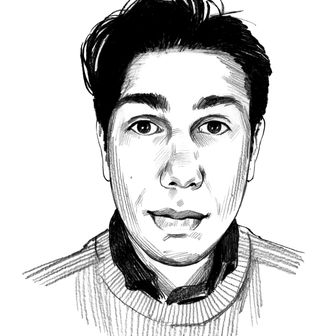
Given the ostensibly loose way How to With John Wilson is filmed and the rigid way it’s edited, it’s hard to imagine what an episode might look like on the page. When Wilson sets out to teach viewers how to appreciate wine or accomplish other such benign tasks, it’s not always clear how much of his journey is planned out in advance and how much is the product of him pulling at threads in real time. Wine gets better with age, he reasons, propelling him camera-first into the home of a military-ration enthusiast who helps him prepare and eat the “grisly” beef of a 1960s meal intended for Vietnam War soldiers.
On July 12, that season-two episode — “How to Appreciate Wine” — was nominated for an Emmy for Outstanding Writing for a Nonfiction Program, confirming that more of the show is conceived in the writers’ room than one might imagine. Writers engage in prolonged conversations about each episode’s themes to find narrative connections. They prepare questions to help Wilson structure his forays into unknown worlds. They help pen the joke-filled, poetic, and emotionally resonant voiceovers Wilson records to accompany his footage. Together, they accomplish the tremendous feat of ensuring each episode feels like a cohesive unit of television rather than a series of loosely related interstitials.
Two hours after he received the news of his nomination, Wilson discussed his reaction to the announcement, his memories of writing this episode, and whether or not he’ll be bringing his camera to the Emmys.
Congratulations on your Emmy nomination!
Thank you! It’s really surreal.
Where were you when you heard the news?
I was writing. I’m in the production office right now, doing a revision on one of the scripts. My mom called me, because she was watching it very closely. She was very excited. It was very sweet.
What was that conversation like?
She said “Johnny, you got it!” And I was like, “What are you talking about?” She was like, “You got the nomination!” And I was like, “How do you even know?” She has some sort of superpower when it comes to finding information about me as it comes out on the internet.
It’s pretty appropriate that you were writing while you received an Emmy nomination for writing.
I try not to focus on this stuff too much, because I don’t want to get caught up on the wrong things, but it’s so surreal. I never thought that we would be recognized for something like this or that I would be in this situation. It almost feels like getting Best in Show at a horse competition.
It’s funny to me how people have spoken at length about how hard your show is to categorize, and then the Emmys just threw their hands up in the air and were like, “Well, it’s not fiction, that’s for sure.”
It makes sense. I always wanted to consider it like a documentary show. But I was always horrified of writing my whole life, so I find this so strange. I obviously can’t take all the credit. I had a lot of amazing help from my co-writers: Michael Koman, Conner O’Malley, and Susan Orlean. I texted them immediately, and they were all really excited. They’re all legends in my eyes.
What did you find so horrifying about writing?
I felt stupid. I was always afraid of saying the wrong thing and having the wrong ideas. The reason I started writing narration for the How to movies initially was to get over that. So much of the design of the show is about getting over things I was insecure about: I hated the sound of my recorded voice, I hated the tone of my written word, and I wanted to confront all that stuff by forcing myself to do it, publishing it, and improving over time. That’s why I think it’s so wild that we’re being recognized for writing. I also always thought that I would end up in some kind of movie-adjacent thing. I’m still registering the fact that it’s all TV now. It’s almost like being nominated for a Tony. I never thought that I would be in a world like that. But who knows? Maybe I’ll make a musical one day.
What do you remember about writing “How to Appreciate Wine” in particular?
I thought of the idea, because I had some friends that were really into wine, and I had a hard time getting excited whenever they talked about it. We started to talk very broadly about what was interesting about wine appreciation without directly addressing actual wine culture, and talking about all the things that are just a few degrees off from it. Then we got into a larger conversation about taste, and it’s an iterative process from there. Once we were done with the writers’ room, I had to go off and try a bunch of stuff, and that’s when the stuff that we couldn’t predict ended up making it into the episode. That’s when we encountered these energy-drink people. That was completely unexpected, and it ended up becoming a huge third-act piece we didn’t anticipate. And I always had the NXIVM story in my back pocket. I knew I wanted to deploy it at one point, and I even considered doing it in the first season, but nothing felt quite right, and I think I was also still a little mortified of my collegiate a cappella history. I wasn’t quite ready to come out with it in the first season. But it all just felt so perfect as I continued to explore wine, and my co-writers encouraged me to include it. I got over the embarrassment of it pretty quickly, and I’m actually kind of proud of it now.
Did you go back and forth a lot with the other writers before you decided you just had to show up at the CEO of the energy-drink company’s mansion?
We were actually about to fly back to New York, but on the way to the airport, we just decided to say “Fuck it” — or, you know, “Screw it, we actually have his address from the internet. Let’s just go and see what happens.” I was joking around in the car with my producer Brendan and co-writer Michael about what we thought was going to happen: “Is he just going to open his door and give me a tour of his place?” We were joking about how outrageous this hypothetical was, and then beat by beat, he did every single thing that we were joking about him doing. It was one of the most exhilarating afternoons of my life.
How much of the Emmy nomination do you think can be attributed to the part of the episode’s voiceover where you just keep repeating the expression “Nice legs”?
You know, It takes a team of pedigreed writers to write something like that. Hopefully the leg section will take us over the finish line. I would consider that to be one of the best pieces of writing in the episode.
How did you curate your writers’ room?
It was all new to me. I had no idea what a writers’ room was supposed to be. I just knew who inspired me the most. Michael Koman has been a huge part of some really genre-defining comedy, Susan Orlean is this legendary journalist and essayist who I think about constantly whenever I’m writing stuff, Connor O’Malley is this Tasmanian devil of a comedian that I’d been following since his Vine days, and Alice Gregory is another amazing journalist who wrote on a bunch of other episodes. I wanted to have a blend of really smart journalism and really challenging comedy, because I feel like these are all parts of myself and representative of the work I want to do.
I get the impression that the pomp and circumstance of a major awards show may not be your most natural environment. Are you looking forward to the experience of, for example, walking the red carpet?
Yeah, I think it’s really novel! I love being in environments that I’m not usually in. I don’t know what I’m going to wear. I have one thing that’s not wrinkled that I keep up in my closet, and I’ve been wearing that to every appearance I’ve had in the past year. But I think people might be starting to catch on. I might need to get something new.
Is it the type of thing you’d want to bring your camera to?
Totally. I always have my iPhone with me, and that’s what I shoot a lot of the show on anyways. So, I will be shooting it if I’m fortunate enough to be able to go. I’m not sure if this is one of those categories where they make you watch from an alley next door or something. But even if so, that would be funny to document.


